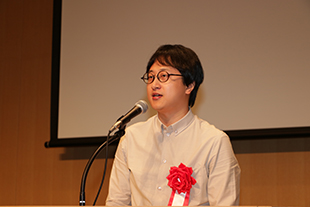 The 18th Asia Pacific Research Prize (Iue Prize) winner: Dr. Park Kyung-Min
The 18th Asia Pacific Research Prize (Iue Prize) winner: Dr. Park Kyung-Min
Title of Dissertation: “Former Japanese Colonial Elites and the Origin of Japanese Foreign Policy towards Korea (ROK): Convergence of Perceptions and Responses to ‘the total property of colonial assets,’ 1945-1953”

- Dr. Park Kyung-Min
-
- Career -
Kyung-Min Park is a part-time lecturer of the Global College of Humanities and Area Studies at Kookmin University in South Korea. He received his B.A. in 2008 and M.A. from the Department of International Area Studies, Kookmin University in 2010. He received his Ph.D. in Law (Major: Political Science) at Keio University in Japan. Afterward, He worked as a full-time researcher at the Institute of Japanese Studies, Kookmin University and a visiting scholar at the Faculty of Asian and Middle Eastern Studies, University of Cambridge. His research interests are political and diplomatic history in East Asia, and Korea under Japanese Rule. Repatriation from Korea and the Road to Japan‐South Korea Normalization Negotiations (Tokyo: Keio University Press, 2018)
- Summary -
My PhD dissertation examines how former Japanese colonial elites, who lived in Korea until the end of the war, and the Japanese government dealt with the issue of compensation of Japanese foreign assets in Korea, which were confiscated by Ordinance No.33 (December 1945) of the USAMGIK immediately after the end of World War II. My dissertation analyses the process of how the perceptions and responses of these Japanese colonial elites and the Japanese government converged into a certain set of numbers, defining “the total property of colonial assets” that Japan had in Korea. This number became the basis of the property claims towards Republic of Korea (ROK) by the Japanese government, which was brought up during the negotiation over the normalization of ROK and Japan. Furthermore, my argument puts the “Kubota statement (October 1953),” which was a symbolic statement that encapsulates how the Japanese government perceived Korea at the time, into its proper historical context. I argue that this continuity inherent in the issue of colonial assets was one of the main factors preventing the ROK and Japan from successfully negotiating a normalization agreement.The analytical perspective of my dissertation is on the former Japanese colonial elites, which consists of individuals and private corporations, and the “total property of colonial assets.” I define “former Japanese colonial elites (chôsen-enkosha 朝鮮縁故者) ” as “powerful individuals who had decent jobs and good academic backgrounds, who shared necessary knowledge and information with the Japanese government.” These individuals defined themselves when the primary members of “the Keijyo-Japanese Group” (keijyô-nihonjin-sewakai 京城日本人世話会established August, 1945) joined “the Japanese Repatriates from Korea” (chôsen-hikiage-dôhôsewakai 朝鮮引揚同胞世話会established March, 1946) after their repatriation, which was then integrated into “the Dôwa Association (Dôwa gyôkai 同和協会established July, 1947).” I focus on these “former Japanese colonial elites” for the following reasons. First, these individuals can be called “Korean repatriates (chôsen-hikiagesha 朝鮮引揚者) ” or “Korean related persons (chôsen-kankeisha 朝鮮関係者) ,” but some of them were already back in Japan when the Potsdam Declaration was accepted in August 1945. As such, the term “Korean repatriates” would not be accurate for those who were already back in Japan before the end of the war. Moreover, the term “Korean related persons” is too broad. As such, I opted for the phrase “former Japanese colonial elites” in order to maintain consistency of its meaning, as an actor who had at one point lived in colonial Korea. These include bureaucrats from the Governor-General of Korea (朝鮮総督府) , journalists from the Keijô Nippô (京城日報) , academics from the Keijô Imperial University (京城帝国大学) , and private business owners in Korea. By closely examining the perceptions and responses that these former Japanese colonial elites took vis-à-vis foreign assets in Korea, I attempt to extract the continuities that lie behind the negotiation process of normalization.






